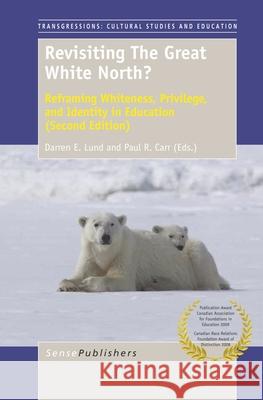Revisiting the Great White North? : Reframing Whiteness, Privilege, and Identity in Education (Second Edition) » książka
Revisiting the Great White North? : Reframing Whiteness, Privilege, and Identity in Education (Second Edition)
ISBN-13: 9789462098688 / Angielski / Twarda / 2015 / 340 str.
Revisiting the Great White North? : Reframing Whiteness, Privilege, and Identity in Education (Second Edition)
ISBN-13: 9789462098688 / Angielski / Twarda / 2015 / 340 str.
(netto: 420,89 VAT: 5%)
Najniższa cena z 30 dni: 423,64
ok. 30 dni roboczych.
Darmowa dostawa!
Returning seven years later to their original pieces from this landmark book, over 20 leading scholars and activists revisit and reframe their rich contributions to a burgeoning scholarship on Whiteness. With new reflective writings for each chapter, and valuable sections on relevant readings and resources, this volume refreshes and enhances the first text to pay critical and sustained attention to Whiteness in education, with implications far beyond national borders. Contributors include George Sefa Dei, Tracey Lindberg, Carl James, Cynthia Levine-Rasky, and the late Patrick Solomon. Courageously examining diverse perspectives, contexts, and institutional practices, contributors to this volume dismantle the underpinnings of inequitable power relations, privilege, and marginalization. The book s relevance extends to those in a range of settings, with abundant and poignant lessons for enhancing and understanding transformative social justice work in education. Revisiting The Great White North? offers terrific grist for examining the persistence of Whiteness even as it shape-shifts. Chapters are comprehensive, theoretically rich, and anchored in personal experience. Authors reflections on the seven years since publication of the first edition of this book complexify how we understand Whiteness, while simultaneously driving home the need not only to grapple with it, but to work against it. Christine Sleeter, Professor Emerita, California State University Monterey Bay Our understanding of racial inequities in education will be impoverished unless we look deeply at White privilege, its variation in different contexts, and resistances to change. Such is the call in this important book by Lund, Carr, and colleagues, whose analyses within Canadian contexts, framed and re-framed for this captivating revised edition, will be useful to educators and scholars around the world. Read this book today. Kevin Kumashiro, Dean, School of Education, University of San Francisco; President, National Association for Multicultural Education Darren Lund and Paul Carr have given the contributors to their original 2007 text the opportunity to revisit, rethink, reconceptualize, and reframe their earlier work. The result is an interesting, invigorating, and unsettling group of chapters that challenge readers to also revisit and rethink their own ideas about Whiteness, privilege, and power . Teachers, administrators, policymakers, and researchers will all benefit from this critical work. Sonia Nieto, Professor Emerita, Language, Literacy, and Culture College of Education, University of Massachusetts, Amherst Lund and Carr bring together a superb collection of authors who collectively challenge readers to go beyond liberal platitudes about race until educators confront the political, social and economic consequences of inequitably distributed privilege, the path towards equality and freedom will remain elusive. By immersing us in the discourse of Whiteness, the essays in this book illuminate that very path. Joel Westheimer, University Research Chair & Professor, Faculty of Education, University of Ottawa"
Returning seven years later to their original pieces from this landmark book, over 20 leading scholars and activists revisit and reframe their rich contributions to a burgeoning scholarship on Whiteness. With new reflective writings for each chapter, and valuable sections on relevant readings and resources, this volume refreshes and enhances the first text to pay critical and sustained attention to Whiteness in education, with implications far beyond national borders. Contributors include George Sefa Dei, Tracey Lindberg, Carl James, Cynthia Levine-Rasky, and the late Patrick Solomon. Courageously examining diverse perspectives, contexts, and institutional practices, contributors to this volume dismantle the underpinnings of inequitable power relations, privilege, and marginalization. The book’s relevance extends to those in a range of settings, with abundant and poignant lessons for enhancing and understanding transformative social justice work in education.Revisiting The Great White North? offers terrific grist for examining the persistence of Whiteness even as it shape-shifts. Chapters are comprehensive, theoretically rich, and anchored in personal experience. Authors’ reflections on the seven years since publication of the first edition of this book complexify how we understand Whiteness, while simultaneously driving home the need not only to grapple with it, but to work against it.Christine Sleeter, Professor Emerita, California State University Monterey BayOur understanding of racial inequities in education will be impoverished unless we look deeply at White privilege, its variation in different contexts, and resistances to change. Such is the call in this important book by Lund, Carr, and colleagues, whose analyses within Canadian contexts, framed and re-framed for this captivating revised edition, will be useful to educators and scholars around the world. Read this book today.Kevin Kumashiro, Dean, School of Education, University of San Francisco; President, National Association for Multicultural Education Darren Lund and Paul Carr have given the contributors to their original 2007 text the opportunity to revisit, rethink, reconceptualize, and reframe their earlier work. The result is an interesting, invigorating, and unsettling group of chapters that challenge readers to also revisit and rethink their own ideas about Whiteness, privilege, and power …. Teachers, administrators, policymakers, and researchers will all benefit from this critical work.Sonia Nieto, Professor Emerita, Language, Literacy, and Culture College of Education, University of Massachusetts, AmherstLund and Carr bring together a superb collection of authors who collectively challenge readers to go beyond liberal platitudes about race … until educators confront the political, social and economic consequences of inequitably distributed privilege, the path towards equality and freedom will remain elusive. By immersing us in the discourse of Whiteness, the essays in this book illuminate that very path.Joel Westheimer, University Research Chair & Professor, Faculty of Education, University of Ottawa











